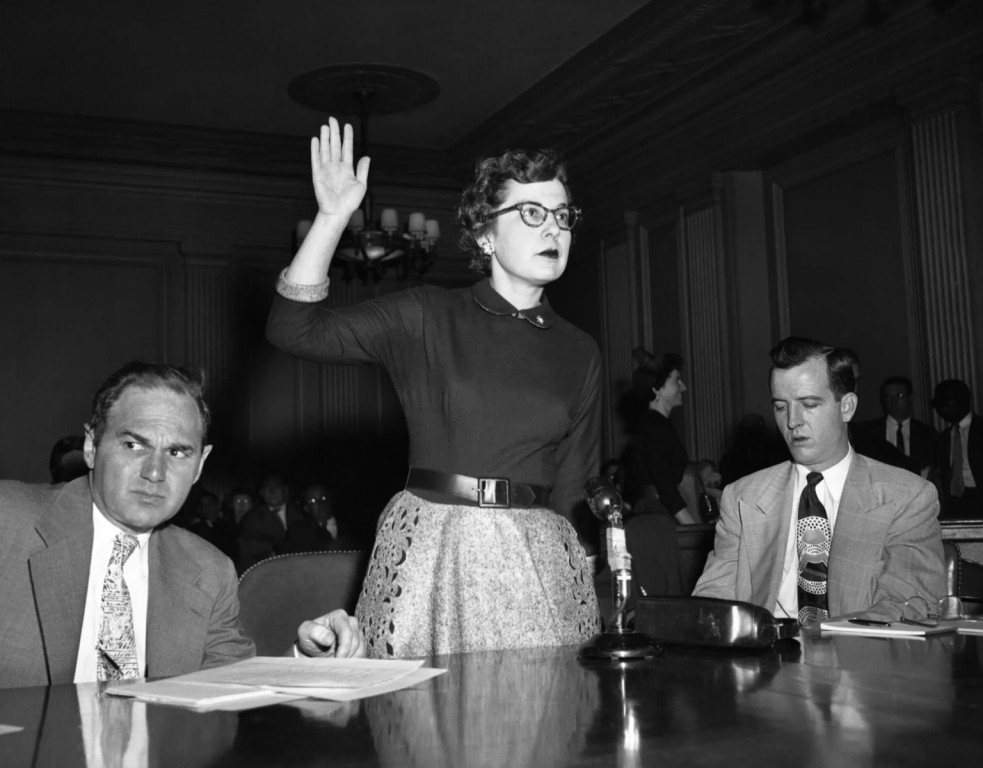 Jamelle Bouie
Jamelle Bouie
Published on The New York Times
Credit…Bettmann Archive/Getty Images
Without making a direct analogy between then and now, I think that this perspective is a useful one to have in mind as conservatives pursue yet another witch hunt against those they perceive as enemies of American society, using whatever state power they happen to have at their disposal. Both the crusade against “critical race theory” and the slanderous campaign against L.G.B.T.Q. educators and education are as much about undermining key public goods (and stigmatizing the people who support them) as they are about generating enthusiasm for the upcoming midterm elections.
To be clear, this isn’t some secret. Christopher Rufo, a right-wing provocateur who helped instigate both the panics against “critical race theory” and against L.G.B.T.Q. educators in schools, has openly said that he hopes to destroy public education in the United States. “We are right now preparing a strategy of laying siege to the institutions,” he said last November in an interview with my colleague Michelle Goldberg. In a recent speech, delivered to an audience at the conservative Hillsdale College, Rufo declared that “to get universal school choice you really need to operate from a premise of universal public school distrust.”
It’s not subtle.
Republican lawmakers are similarly open about why they ginned up this panic: to dismantle public education for political and ideological reasons. Last year, Republicans in Michigan backed a bill that would slash school funding if educators taught “critical race theory,” “anti-American” ideas about race in the United States or material from The New York Times’s 1619 Project.
Earlier this month, Ohio Republicans introduced a bill prohibiting any public, community or private school (that accepts vouchers) in the state from teaching, using or providing “any curriculum or instructional materials on sexual orientation or gender identity” in kindergarten through third grade. In practice, schools would likely have to remove any books or materials that deal with L.G.B.T.Q. issues. Teachers and school officials who violate the law, which mirrors a controversial Florida law its opponents call “Don’t Say Gay,” would be sanctioned with either an official admonishment, “licensure suspension, or licensure revocation” depending on the “severity of the offense.” School districts themselves could lose funding.
And speaking of Florida, Gov. Ron DeSantis signed a bill this week to make it more difficult, in some cases, for professors at public universities to attain or retain tenure, following other bills meant to curtail the teaching of “critical race theory” and, as mentioned, to keep any acknowledgment of L.G.B.T.Q. gender identity out of classrooms. “We need to make sure the faculty are held accountable and make sure they don’t just have tenure forever without having any type of ways to hold them accountable or evaluate what they’re doing,” DeSantis said at a news conference. Chris Sprowls, the speaker of the House in Florida, framed the legislation as a way to prevent “indoctrination” of students.
With few exceptions (most notably Mallory McMorrow, a Michigan state lawmaker who loudly criticized and condemned one of her Republican colleagues for accusing her of attempting to “groom” and “sexualize” kindergartners), the Democratic Party has been conspicuously quiet as these panics metastasized, even as one of them — the attack on teaching the history of race in the United States — helped deliver the Virginia governor’s mansion to Republicans.
The theory seems to be that Democrats can only lose if they engage this culture war, and that they’ll be on safer ground if they can deliver in Washington and run on their policy achievements without getting into the muck with Republicans.
Democrats have notably not delivered on many of their promises. The bulk of President Biden’s agenda is stalled in Congress, and the White House has been reluctant to the point of timidity when it comes to the use of executive orders to achieve its goals. But even if that were not the case, this posture toward the culture war would be a mistake. These are not just attacks on individual teachers and schools; they don’t stigmatize just vulnerable children and their communities; they are the foundation for an assault on the very idea of public education, part of the long war against public goods and collective responsibility fought by conservatives on behalf of hierarchy and capital.
These are not distractions to ignore; they are battles to be won. The culture war is here, whether Democrats like it or not. The only alternative to fighting it is losing it.
Without making a direct analogy between then and now, I think that this perspective is a useful one to have in mind as conservatives pursue yet another witch hunt against those they perceive as enemies of American society, using whatever state power they happen to have at their disposal. Both the crusade against “critical race theory” and the slanderous campaign against L.G.B.T.Q. educators and education are as much about undermining key public goods (and stigmatizing the people who support them) as they are about generating enthusiasm for the upcoming midterm elections.
To be clear, this isn’t some secret. Christopher Rufo, a right-wing provocateur who helped instigate both the panics against “critical race theory” and against L.G.B.T.Q. educators in schools, has openly said that he hopes to destroy public education in the United States. “We are right now preparing a strategy of laying siege to the institutions,” he said last November in an interview with my colleague Michelle Goldberg. In a recent speech, delivered to an audience at the conservative Hillsdale College, Rufo declared that “to get universal school choice you really need to operate from a premise of universal public school distrust.”
It’s not subtle.
Republican lawmakers are similarly open about why they ginned up this panic: to dismantle public education for political and ideological reasons. Last year, Republicans in Michigan backed a bill that would slash school funding if educators taught “critical race theory,” “anti-American” ideas about race in the United States or material from The New York Times’s 1619 Project.
Earlier this month, Ohio Republicans introduced a bill prohibiting any public, community or private school (that accepts vouchers) in the state from teaching, using or providing “any curriculum or instructional materials on sexual orientation or gender identity” in kindergarten through third grade. In practice, schools would likely have to remove any books or materials that deal with L.G.B.T.Q. issues. Teachers and school officials who violate the law, which mirrors a controversial Florida law its opponents call “Don’t Say Gay,” would be sanctioned with either an official admonishment, “licensure suspension, or licensure revocation” depending on the “severity of the offense.” School districts themselves could lose funding.
And speaking of Florida, Gov. Ron DeSantis signed a bill this week to make it more difficult, in some cases, for professors at public universities to attain or retain tenure, following other bills meant to curtail the teaching of “critical race theory” and, as mentioned, to keep any acknowledgment of L.G.B.T.Q. gender identity out of classrooms. “We need to make sure the faculty are held accountable and make sure they don’t just have tenure forever without having any type of ways to hold them accountable or evaluate what they’re doing,” DeSantis said at a news conference. Chris Sprowls, the speaker of the House in Florida, framed the legislation as a way to prevent “indoctrination” of students.
With few exceptions (most notably Mallory McMorrow, a Michigan state lawmaker who loudly criticized and condemned one of her Republican colleagues for accusing her of attempting to “groom” and “sexualize” kindergartners), the Democratic Party has been conspicuously quiet as these panics metastasized, even as one of them — the attack on teaching the history of race in the United States — helped deliver the Virginia governor’s mansion to Republicans.
The theory seems to be that Democrats can only lose if they engage this culture war, and that they’ll be on safer ground if they can deliver in Washington and run on their policy achievements without getting into the muck with Republicans.
Democrats have notably not delivered on many of their promises. The bulk of President Biden’s agenda is stalled in Congress, and the White House has been reluctant to the point of timidity when it comes to the use of executive orders to achieve its goals. But even if that were not the case, this posture toward the culture war would be a mistake. These are not just attacks on individual teachers and schools; they don’t stigmatize just vulnerable children and their communities; they are the foundation for an assault on the very idea of public education, part of the long war against public goods and collective responsibility fought by conservatives on behalf of hierarchy and capital.
These are not distractions to ignore; they are battles to be won. The culture war is here, whether Democrats like it or not. The only alternative to fighting it is losing it.



